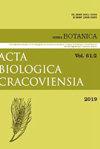龙葵和乌桕中鞣花酸和没食子酸的定量测定。
IF 0.5
4区 生物学
Q4 PLANT SCIENCES
引用次数: 11
摘要
水解单宁及其水解产物鞣花酸(EA)和没食子酸(GA)是许多药用植物的重要成分,具有多种生物活性。龙舌兰和龙舌兰是富含单宁化合物的传统草药。本研究的目的是定量测定野田葵和都市田葵地上部和地下部的游离EA和总GA。优化提取工艺后,采用反相高效液相色谱法(RP-HPLC)对两种化合物进行定量分析。在所调查的材料中,EA的含量高于GA,其中地下部分是总EA和GA最丰富的来源。本文章由计算机程序翻译,如有差异,请以英文原文为准。
Quantitative Determination of Ellagic Acid and Gallic Acid in Geum Rivale L. and G. Urbanum L.
Hydrolyzable tannins and products of their hydrolysis, ellagic acid (EA) and gallic acid (GA), are important constituents of many medicinal plants and exhibit various biological activities. Geum rivale and G. urbanum are traditional herbal remedies rich in tannin compounds. The aim of the study was to quantitate free and total EA and GA in aerial and underground parts of G. rivale and G. urbanum. After optimization of extraction, both compounds were quantitated by reversed phase HPLC (RP-HPLC). EA was more abundant than GA in the investigated material, and underground parts of G. rivale were the richest source of total EA and GA.
求助全文
通过发布文献求助,成功后即可免费获取论文全文。
去求助
来源期刊
CiteScore
3.00
自引率
0.00%
发文量
0
审稿时长
>12 weeks
期刊介绍:
ACTA BIOLOGICA CRACOVIENSIA Series Botanica is an English-language journal founded in 1958, devoted to plant anatomy and morphology, cytology, genetics, embryology, tissue culture, physiology, biochemistry, biosystematics, molecular phylogenetics and phylogeography, as well as phytochemistry. It is published twice a year.

 求助内容:
求助内容: 应助结果提醒方式:
应助结果提醒方式:


